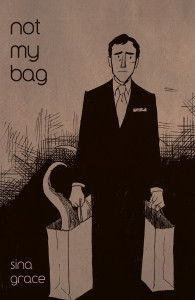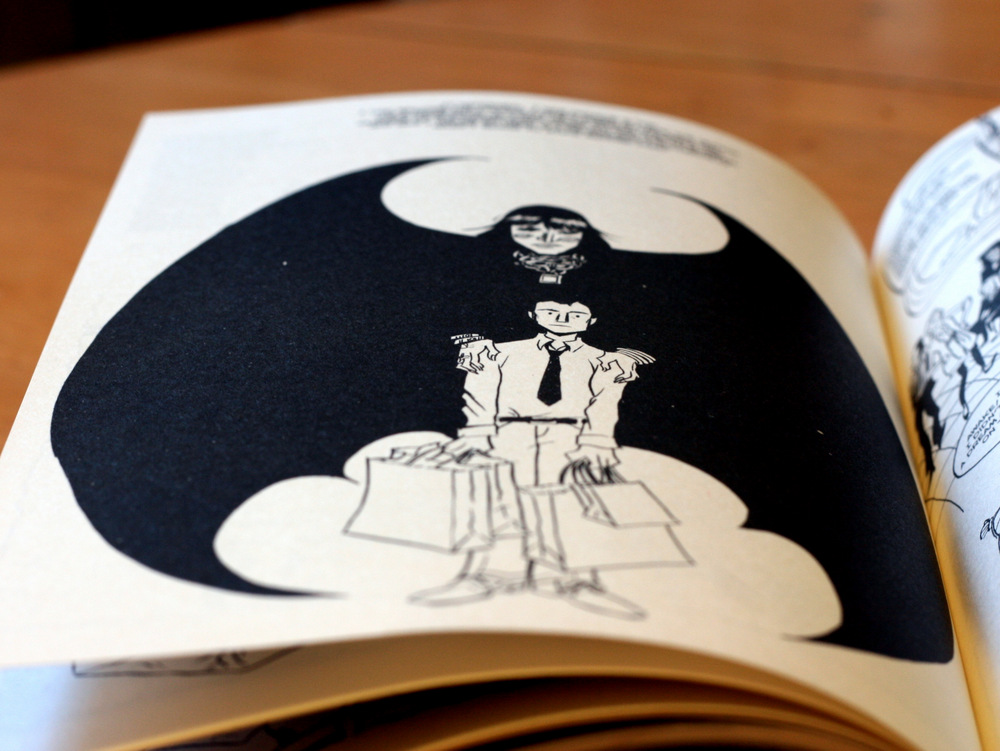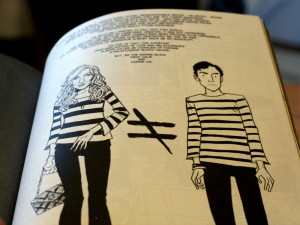Appropriately for a book that is at least in part about the lure of luxury aesthetics, Not My Bag is a gorgeous piece of publishing deign. The endpapers are a grey marl like polished concrete, the print stock is thick, the type is clear and stylish - it's beautiful and it should probably have been a hardback.
In it, Sina Grace (Books with Pictures, Lil' Depressed Boy, and Cedric Hollows) recounts his days working in a department store, being sucked into its high-competition, high-fashion world, and going just slightly mad at the edges. It's not quite Sad Comics, but it's definitely black and white, slice of life, nodding to Blankets comics. That may not be a genre, but it's certainly a recognizable package of styles.
Not My Bag is personal and confessional, with Grace unafraid in places of showing us his less flattering sides. The young artist takes the job to pay the bills, and, haunted by lingering neuroses and failed relationships, slides into superficiality, occasional bitterness, and crass materialism. It ends in the only way it could end - a quiet catastrophe of imposture with Grace storming out of the store, forced to choose an identity and realizing he has chosen correctly.
But there are some gorgeous panels and page compositions taking us through that ending. The day to day of it, the body of the story, is a joy of little observations. The haggard and fading sales shark; the new manager, masked, and sinister verging on occult; the sudden breaks in the visual flow - replacing realism with something emotionally mimetic and decomposing the arrangement of panels to pull out a little detail or foreground a powerful moment; it's good stuff. The book excels when it takes something - most often fashion - and anatomizes it, often dedicating a full page to details, annotating, and exploring.
The retail days that make up the story are a thread of these moments and details. Character interactions will suddenly pull into meticulously sketched touchstones, amplifying the feeling of an identity built out of objects. There's a porcelain pony that represents an old love's heart in ways we are never told. There are memories rendered as photographs or letters, an office full of snow globes, tie pins, cuff links and shoes. People and places are often far less detailed than things, and the big emotional moments - panic, especially - see a vastly simplified visual style, with fewer and softer lines, more curves, more blocks of colour.
Grace's protagonist-self shows us little or nothing of him as an artist. He draws largely off stage. His love of comics is assumed rather than introduced. It's almost a shock to hear comics mentioned at all, much less see him hand one of his books to his boss. His trip to Comic Con is abstracted to a conversation on the stairs. It's sparse, gentle, and slight, where the retail conference before it is a riot of a page. Comics, art, to an extent relationships are not part of this world, and the trip precipitates his final crisis at the department store.
The effect is an incredibly tight focus - there is little outside retail, and little of the retail world outside fashion. Our gaze is tightly controlled, and we're left watching Grace reconstruct his identity around objects, and narrow his relationships to something equally transactional, commercial, and superficial. It's rough going in the middle, and you want to shake him by the shoulders a little. 
The revelation then, that "none of these faces matter", can only seem a little small after all of this. He's snapping out of making some dumb mistakes, and realizing he's been chasing something profoundly artificial. It's not that deep or original, and it doesn't pretend to be. Again, the details are the powerful part. So it stops. There's a disconnect between the narrating and narrated selves, and we don't see quite how Grace gets from there to here. We see him realize he was screwing up in time to stop, and we see him learn that stopping is possible. That's pretty cool.
Not My Bag is well worth picking up. It's a fascinating exploration of the balance of show and tell, and of storytelling through objects and details. It's uncomfortable in places - there are some cringing moments of lack of self-awareness - but it is itself a beautiful little object.



